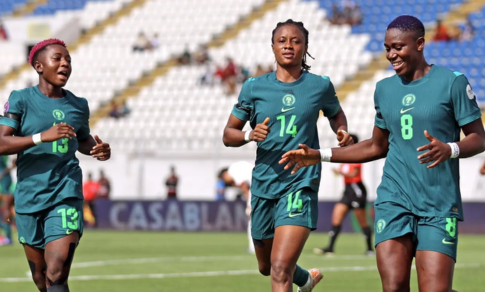The Super Falcons of Nigeria are on the brink of making history as they seek their 10th Women’s Africa Cup of Nations (WAFCON) title when they clash with host nation Morocco in the final of the 13th edition of the tournament on Saturday night at the Olympic Stadium, Rabat.
Head coach Justine Madugu has made it clear that the team has come too far to settle for anything less than the trophy, which they have already lifted nine times in the previous 12 editions.
Nigeria’s path to the final was sealed with a hard-fought 1-0 victory over defending champions South Africa, thanks to a stunning added-time goal by Michelle Alozie in Tuesday’s second semi-final in Casablanca.
“We thank God for making it to the final. Our focus is on lifting the trophy in Rabat on Saturday,” said Coach Madugu.
“South Africa were always going to be tough, but we were ready for them. Our tactical approach worked. We’ve applied that mindset in all five games so far, and we’ll do it again in the final.”
The Super Falcons will face the Atlas Lionesses of Morocco, a team enjoying a meteoric rise in African women’s football. The match is not only a clash of generations but also a symbolic showdown between the continent's most dominant force and one of its fastest-rising powers.
This is the second major continental final in 17 months in which Nigeria faces a host nation, after the Super Eagles battled Côte d’Ivoire in the 2024 AFCON men’s final earlier this year.
Led by captain Rasheedat Ajibade, Nigeria’s squad has impressed with fluid teamwork and attacking depth. Folasade Ijamilusi, Chinwendu Ihezuo, Esther Okoronkwo, and Jennifer Echegini have added attacking dynamism, while defenders like Ashleigh Plumptre and goalkeeper Chiamaka Nnadozie (Africa’s back-to-back Goalkeeper of the Year) have kept the defense tight.
The Falcons have scored 11 goals and conceded just once (a penalty from South Africa’s Linda Motlhalo), showcasing their dominance on both ends of the pitch.
Nigeria’s storied rivalry with Morocco has evolved. Once comfortable winners — including an 8-0 thrashing in Kaduna in 1998 and a 6-0 win in 2000 — the tides began to shift when Morocco beat Nigeria in a penalty shootout during the 2022 semi-final, hosted on home soil.
Morocco’s transformation from heavy underdogs to continental finalists in back-to-back tournaments is nothing short of remarkable. Their style, confidence, and home advantage will present a serious challenge for the reigning queens of African women’s football.
The Olympic Stadium is expected to be packed to capacity, in what promises to be a thrilling and historic night for women’s football on the continent.








ADD A COMMENT :